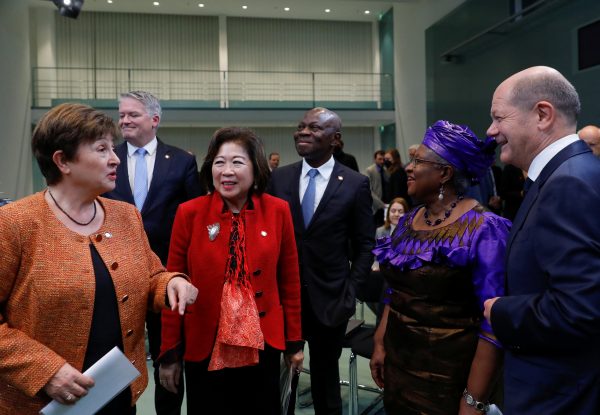Rescuing the WTO is one of the most pressing tasks facing world leaders today. As Ken Heydon argued earlier this week, the next WTO ministerial conference in Abu Dhabi will be a crucial test. The agenda laid out by WTO Director-General Ngozi Okonjo-Iweala will cover a number of worthy topics, but none of them get to the heart of the crisis around the national security exemption.
In the aftermath of World War II, when the rules of the system were being devised, it made sense to carve out a space within the rules governing international trade for nations to take extraordinary measures if national security dictated. Even the most ardent free-trader would agree that a country at war has the right to restrict the export of weapons and ammunition to its enemy.
The phrasing of the exception, codified in Article XXI(b) of the rules of the General Agreement on Tariffs and Trade (GATT), left room for nations to hide behind dubious justifications for trade restrictions, and the limits were sometimes tested. Most notoriously, in 1975, Sweden tried to protect its local footwear manufacturers by imposing import quotas on certain types of shoes worn by Swedish soldiers, claiming that what would otherwise be deemed a blatantly protectionist form of industrial policy fell under the national security exemption in the trading rules. Back then, at least, Stockholm had enough shame to withdraw the measure only a few years after its introduction.
Today, however, the country most associated with the establishment of the open liberal economic order has lost its sense of shame. Under the Trump administration, the United States invoked the WTO national security exception to justify considerably higher import duties on imported steel and aluminium. As a WTO panel later ruled, there was no ‘emergency in international relations’ to justify the national security exception for Trump’s steel tariffs.
Having lost the case, the United States appealed: but it has since gutted the WTO appellate body by refusing to consent to the appointment of new judges. The body is still effectively on life support, though it has been partially resurrected in the form of the Multi-Party Interim Appeal Arbitration Arrangement, which replicates WTO appellate rules for those who sign on. So far 52 members of the WTO have joined this workaround dispute settlement arrangement, fortunately including the world’s largest trader, China, the European Union, Japan, Canada and Australia.
The Biden administration doubled down on Trump’s national security tariffs with US Trade Representative Katherine Tai trashing the WTO ruling last December.
Increasing use of the national security exemption has the potential to rip a hole in the centre of the global trade order. If any issue can be considered a national security issue — and one only has to think of the increasing list of goods and services that security hawks like to designate as ‘dual use’ — then the rules will offer very little defence against protectionism. And if the appellate body is not restored, and the United States refuses to sign on to a replacement, then the rules-based order could decay around the hole that America has left, and the world economy will continue to fracture along geopolitical lines.
The increasing use of the national security exemption is symptomatic of a broader trend in policymaking towards the subordination of economic policy to geopolitical ends. Massive new subsidies are offered to ‘re-shore’ and ‘friend-shore’ production of goods said to be strategically crucial, like semiconductors. Most of these policies are not vetted by even cursory analysis from economists and are driven almost entirely by strategists who think in zero-sum terms: what China loses, the United States must gain.
The options for reforming the WTO in a way that satisfies the United States are complicated, as Mark Tokola writes in the first of this week’s feature articles. Washington might accept the need for more consultation on its use of the national security exemption in exchange for recognition within the WTO that formal action cannot be taken against countries invoking it. This might be an improvement on the current state affairs, but not a major one.
If the WTO is to remain relevant, it has to allow for ‘clubs’ of countries to pursue agreements on non-economic objectives, like labour standards or the environment, Bernard Hoekman, Petros Mavroidis and Douglas Nelson suggest in the second feature this week. The WTO could, on this view, become a venue where the actions of these clubs undergo scrutiny and are made transparent, to ensure that the pursuit of non-economic objectives is not unduly burdening the trading system.
One such club could be like-minded countries that want to codify the use of the national security exemption. An ASEAN-centred grouping could lead on this issue, increasing the chance of China being part of that club.
Ultimately, WTO reform will remain difficult while there is so little goodwill in Washington towards the open trade order. It’s not enough merely to have rules of the game: there has to be a respect for the spirit of those rules, and the consent of the loser who falls afoul of them to be subject to their discipline. This is a wicked problem to fix, but a fix must be found for the sake of the health of the world economy, especially the economies of Asia which depend so vitally upon the WTO regime.
In Asia, where respect for the WTO is perhaps stronger among policymakers than anywhere else in the world, hard heads are needed to solve an existential dilemma for the trade order that has brought so much prosperity to this part of the world.
The EAF Editorial Board is located in the Crawford School of Public Policy, College of Asia and the Pacific, The Australian National University.

